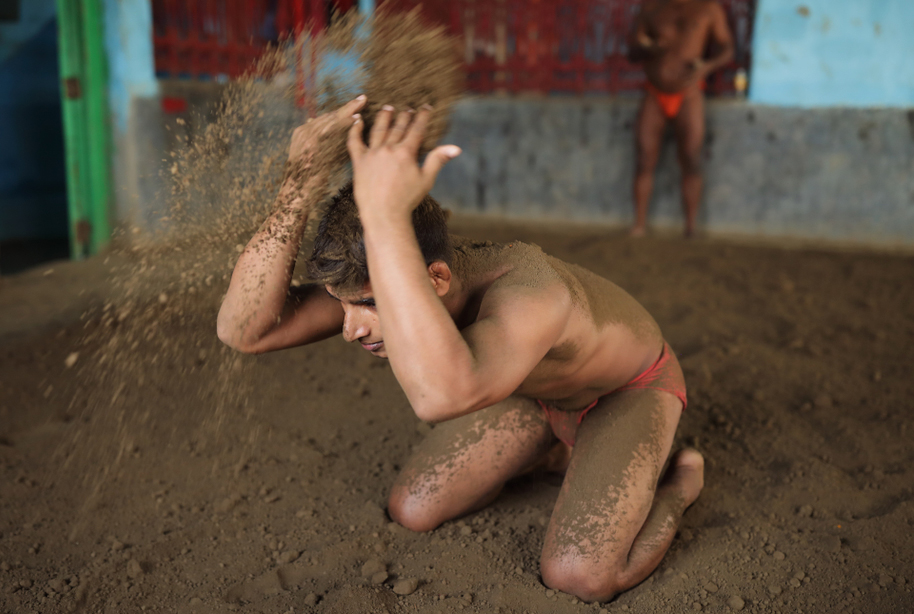He suffered from acute asthma till the age of 10. Playing with friends was a luxury; most days he couldn’t even make it to school. He remained cloistered at home, with a cylinder of oxygen ready at his bedside. Things became a little better when he turned 12 and his uncle — a body builder — started to train him. In the beginning, it was just breathing and stretching exercises along with a balanced, home-made diet. Within two years, he looked healthier. Now he did multiple push-ups and sit-ups, followed by skipping and other games.
At 17, he joined the akhara of bodybuilder Monotosh Roy, the first Asian to be crowned Mr Universe. Dumbell, barbel, weight-lifting, bench presses and other traditional exercises were added to his schedule. After a 45-minute workout session, he had two raw eggs, a glass of milk and a bowl of groundnuts. This was sometimes followed by chapattis, vegetables or slices of toast. At lunch he had a heap of rice, lentils, fish and plenty of leafy greens. In the evening, after half-an-hour of yoga, he’d have a glass of milk or some soaked groundnuts and grams. For dinner there were chapattis, lentils, veggies and chicken or egg, occasionally some fruits.
This helped him gain 20kg of lean body mass (solid muscles, no fat) in a year. He developed a fit and well-sculpted body.
“I am 65 but I still follow this routine, except that I cannot go to the akhara. Instead, I walk a lot,” says orthopaedic surgeon Dr Kunal Sengupta, narrating the story of his life. He still has an enviable physique, even though he has never visited a modern gym or taken high protein supplements or followed a diet prescribed by a physical trainer. “You may or may not be able to boast a six-pack, but a traditional food and exercise regime can give enough punch to your muscles.” According to him, walking, jogging, swimming, cycling and weight-lifting — supported by simple, home-cooked food — can give you a well- sculpted body. “Don’t waste your money on gyms, build your body on your own,” Dr Sengupta advises.
Modern vs traditional
If you wish to sculpt your abs, or have a perfect body like your favourite Bollywood star, you have to follow a high-intensity exercise regimen under the guidance of an efficient trainer. This means that you have to join a top quality gym run by a qualified physical trainer — unless the trainer knows the nuances of the pressure points of bones, cartilages, tendons, ligaments, muscles and joints, he cannot guide you. Unless the trainer has knowledge of human physiology and understands your specific requirements, you may hurt yourself irreparably. In short, you need an experienced trainer; you can’t just copy others or follow an online video.
“I often get to see patients who have damaged their body through an excessive and unguided exercise regimen. Some arrive with ligament tears, while others suffer from critical bone fractures or even spine damage,” says Dr Sengupta. “Sometimes, you may also suffer hidden damage to the bones that manifests as arthritis at a very young age,” he adds.
“Despite having worked out in a good gym, under the training of a good physio or a rehab programme, your bones and muscles can give in with ageing. Extreme diets are also harmful,” he says.
Food facts
A good physique requires a lot of protein but also some carbohydrates. “But you shouldn’t get obsessed,” says nutritionist Vijaya Agarwal. “Focusing too much on proteins for building muscles and skipping carbs upsets balanced nutrition. While an overdose of proteins may build muscles, it is not desirable for health and fitness. So consult an expert before going for a drastic change in diet,” she adds.
Dr Sengupta has a warning for those aspiring to six-pack abs as flaunted by Bollywood icons. “You need to spend lakhs of rupees to sculpt such bodies. Their regimens also have an adverse effect on the body in the long run that you don’t get to know,” he says. He advises youth who aspire to build a muscular body to avoid small and obscure gyms with inefficient trainers. He says, “It’s better to choose a traditional akhara which still follows the gurukul system. An experienced guru can offer personalised advice to his shishya based on his strengths and weakness.”
Physique tips
Here’s Dr Sengupta’s advice on how to build a good physique:
- It’s better to run, walk or jog on the grassy lawn of a park or a muddy natural track than on a treadmill indoors. It is good for your knees and, if the environment is free from pollution (in the early morning), the fresh air pumped into your lungs is a bonus. The morning sun also helps Vitamin D formation, which is good for your bones. If you have problems with your knees, you can try swimming
- Cycle or walk if you don’t have to cover a long distance, such as to the market. If you have no problems with your back, knees, heart or lungs, you can try cardio exercises such as burpis, rock-climbing and jumping jacks. These help cut down flab all over the body and strengthen muscles
- Don’t sit for too long at a stretch. Get up and take a walk. Keep moving whenever possible
- Consult a doctor or get a fitness trainer to create a simple exercise routine for you. For at least 20 minutes a day, three days a week, you can try squats, leg extensions, iron-shoe exercise, leg curl, dumbell, bench press, light weight lifting, push-ups and so on
- After exercising, try to do yoga or breathing exercises for 10-15 minutes. This will make your body flexible and help maintain positive thinking.
If you thought you couldn’t afford to bulk up, try the desi way.











